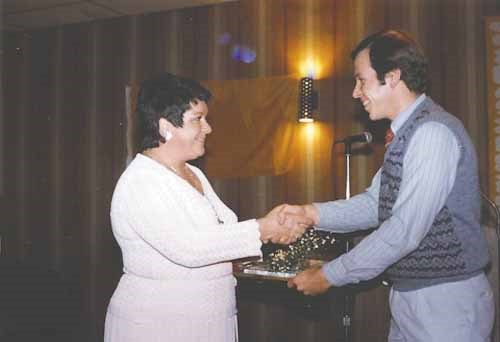This is the third and last of three articles to celebrate the 65th anniversary of the Yorkton Film Festival. The first two parts in the series described the innovation and audacity of a group of Yorkton volunteers who established the event and saw it through the first decade of growth. This article describes the near abandonment of the event in the 1960s and its transformation in the 1970s.
In the 1960s, the innovation and determination of an earlier decade faded away. With the advent of television, interest in documentary film plummeted. Canadians simply considered that the Ed Sullivan Show and Hockey Night in Canada were more interesting than an evening of documentary film. The Yorkton Film Council ran out of steam and out of money, too.
In 1968, the few remaining members of the Yorkton Film Council met to organize the 1969 festival. The following spring, Dave Sharples, NFB representative from Regina, reported that the committee had decided it was "too late" and they were "too little" to carry on. The Yorkton Film Council decided to disband.
A disappointed Nettie Kryski, for twenty years festival treasurer and secretary, made an appointment with Mayor Allan Bailey. She wanted to leave the valued guest book with the City. She thought the book was important. It contained the signatures of all the visiting dignitaries from foreign embassies and from the Canadian film industry. She wanted to let Yorkton's most influential citizen know that the festival was about to close. Allan talked over the situation with his wife, Colleen, a dynamo in the local arts community and a future woman of influence on the Saskatchewan and Canadian arts scene. Colleen and Allan Bailey would not see the festival die. The group formed a new organization, the Yorkton International Film Festival Society. The determination and commitment of that group would see the festival through to the innovation of the 1970s.
The first step towards transformation was the election of creative leaders to the board of directors: Colleen Bailey, Laurence Pearson, Elwyn Vermette and Brian Woodward. Their work as individuals and with a committed executive and group of volunteers took the event from near death in 1969 to an explosive growth by the end of the decade.
The change was staggering - audacious even. The festival introduced after theatre parties to draw people to the screenings and organized workshops for film makers and conferences for industry people. The executive found high-calibre adjudicators whose profile drew more film entries, a success that was not without its problems. The festival outgrew the capability of volunteers to cope with the increased workload. The executive needed an employee or two - preferably two. To qualify for government grants for salaries, the festival had to limit its scope to Canadian film. The executive made the tough decision and abandoned its international format. With the additional money, the festival was able to hire staff, to move from a biennial festival to one held yearly. The decisions were tough, but innovative. They sprang from the audacity of a committed group of Saskatchewan volunteers.
May 24-27, 2012 the Yorkton Film Festival will celebrate its 65th anniversary. This is an event not just to appreciate the longevity of a Saskatchewan and Canadian institution, but an event to recognize the audacity of a group of volunteers who persevered when others said it couldn't be done.



